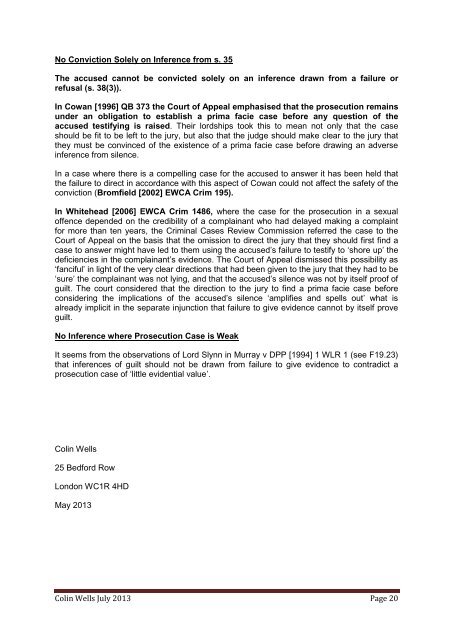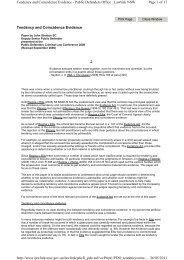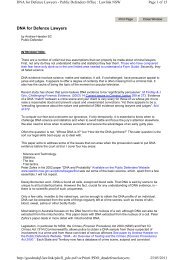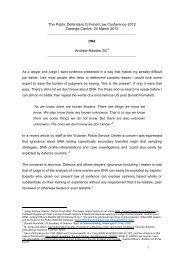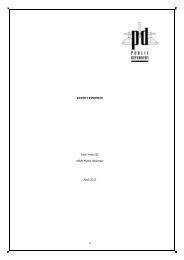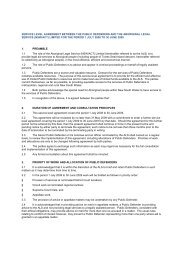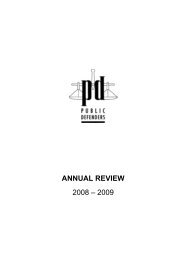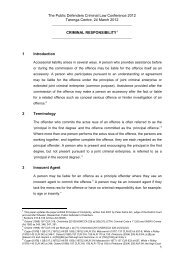Right to Silence: inferences from silence - The Public Defenders
Right to Silence: inferences from silence - The Public Defenders
Right to Silence: inferences from silence - The Public Defenders
You also want an ePaper? Increase the reach of your titles
YUMPU automatically turns print PDFs into web optimized ePapers that Google loves.
No Conviction Solely on Inference <strong>from</strong> s. 35<br />
<strong>The</strong> accused cannot be convicted solely on an inference drawn <strong>from</strong> a failure or<br />
refusal (s. 38(3)).<br />
In Cowan [1996] QB 373 the Court of Appeal emphasised that the prosecution remains<br />
under an obligation <strong>to</strong> establish a prima facie case before any question of the<br />
accused testifying is raised. <strong>The</strong>ir lordships <strong>to</strong>ok this <strong>to</strong> mean not only that the case<br />
should be fit <strong>to</strong> be left <strong>to</strong> the jury, but also that the judge should make clear <strong>to</strong> the jury that<br />
they must be convinced of the existence of a prima facie case before drawing an adverse<br />
inference <strong>from</strong> <strong>silence</strong>.<br />
In a case where there is a compelling case for the accused <strong>to</strong> answer it has been held that<br />
the failure <strong>to</strong> direct in accordance with this aspect of Cowan could not affect the safety of the<br />
conviction (Bromfield [2002] EWCA Crim 195).<br />
In Whitehead [2006] EWCA Crim 1486, where the case for the prosecution in a sexual<br />
offence depended on the credibility of a complainant who had delayed making a complaint<br />
for more than ten years, the Criminal Cases Review Commission referred the case <strong>to</strong> the<br />
Court of Appeal on the basis that the omission <strong>to</strong> direct the jury that they should first find a<br />
case <strong>to</strong> answer might have led <strong>to</strong> them using the accused’s failure <strong>to</strong> testify <strong>to</strong> ‘shore up’ the<br />
deficiencies in the complainant’s evidence. <strong>The</strong> Court of Appeal dismissed this possibility as<br />
‘fanciful’ in light of the very clear directions that had been given <strong>to</strong> the jury that they had <strong>to</strong> be<br />
‘sure’ the complainant was not lying, and that the accused’s <strong>silence</strong> was not by itself proof of<br />
guilt. <strong>The</strong> court considered that the direction <strong>to</strong> the jury <strong>to</strong> find a prima facie case before<br />
considering the implications of the accused’s <strong>silence</strong> ‘amplifies and spells out’ what is<br />
already implicit in the separate injunction that failure <strong>to</strong> give evidence cannot by itself prove<br />
guilt.<br />
No Inference where Prosecution Case is Weak<br />
It seems <strong>from</strong> the observations of Lord Slynn in Murray v DPP [1994] 1 WLR 1 (see F19.23)<br />
that <strong>inferences</strong> of guilt should not be drawn <strong>from</strong> failure <strong>to</strong> give evidence <strong>to</strong> contradict a<br />
prosecution case of ‘little evidential value’.<br />
Colin Wells<br />
25 Bedford Row<br />
London WC1R 4HD<br />
May 2013<br />
Colin Wells July 2013 Page 20


